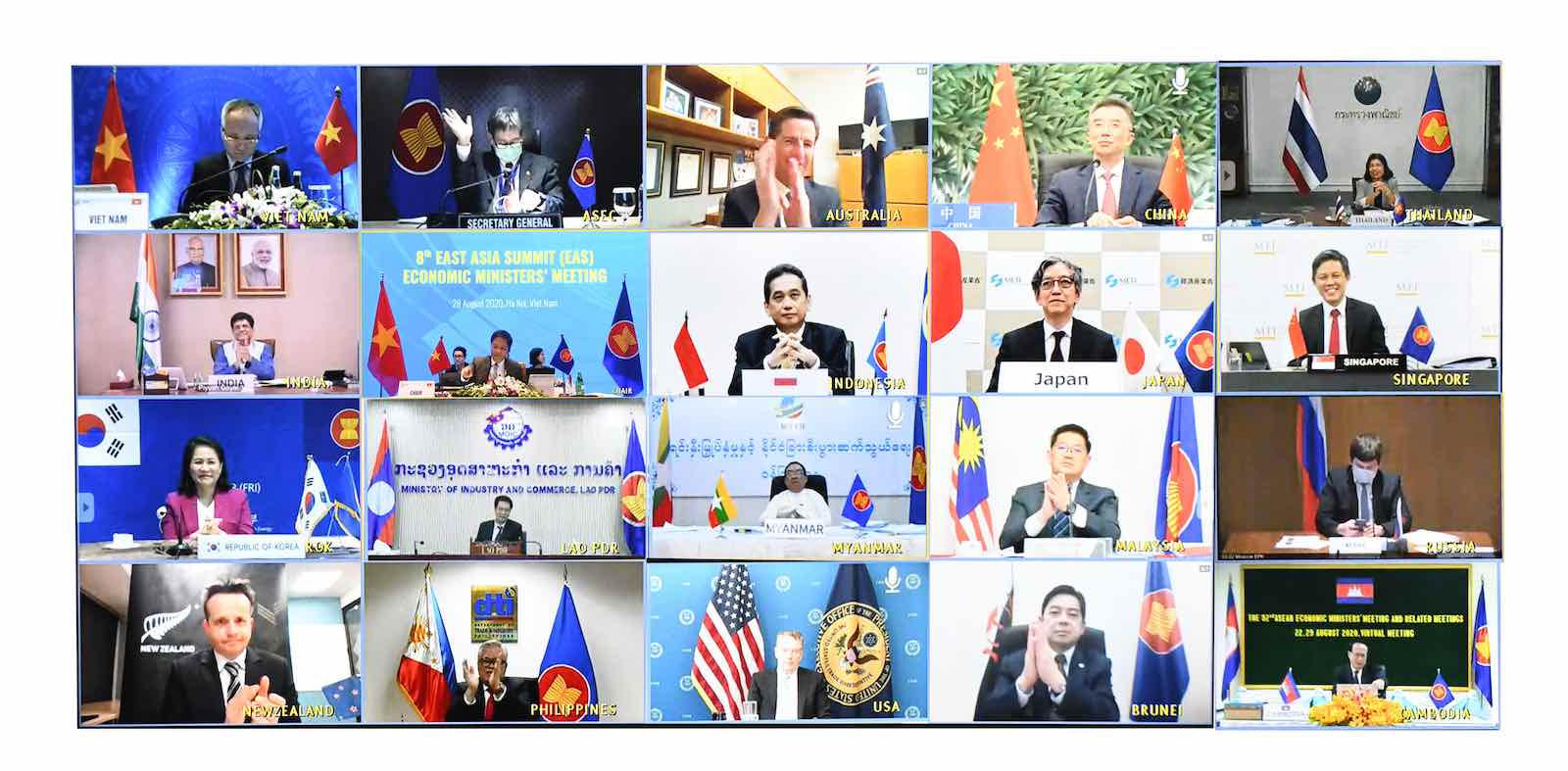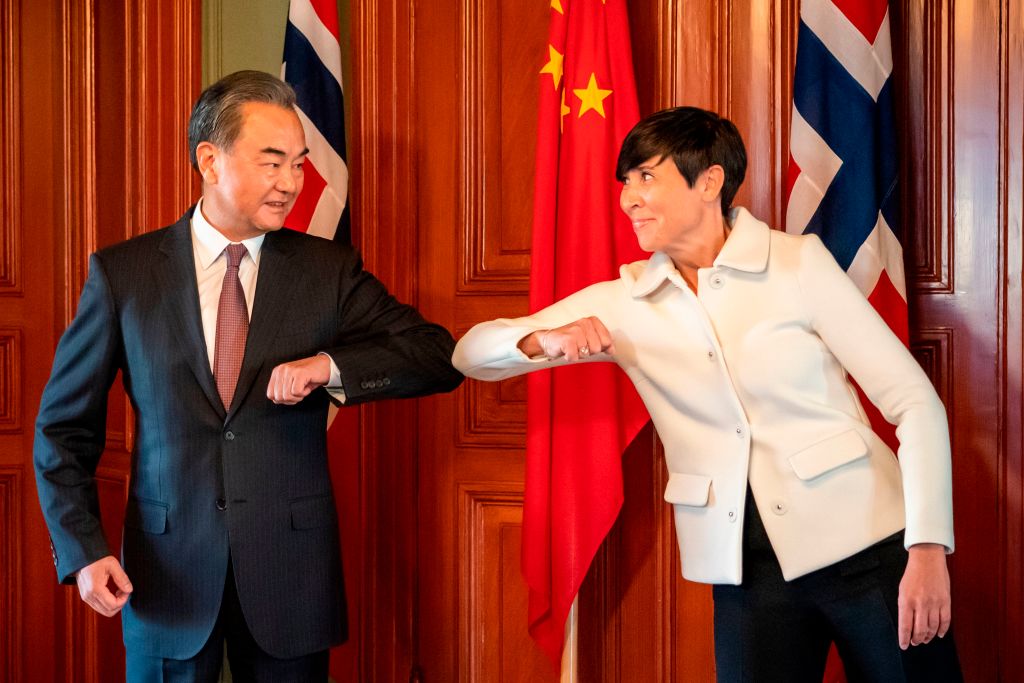BEN BLAND
 Say it quietly, lest the wrath of the pandemic gods be triggered. But the wheels of in-person diplomacy are starting to turn again across Asia. The smiling handshakes are gone, replaced by awkward elbow bumps and socially distanced photo opportunities. The negotiating tables have been moved further apart. And there are face masks and hand-sanitiser all round.
Say it quietly, lest the wrath of the pandemic gods be triggered. But the wheels of in-person diplomacy are starting to turn again across Asia. The smiling handshakes are gone, replaced by awkward elbow bumps and socially distanced photo opportunities. The negotiating tables have been moved further apart. And there are face masks and hand-sanitiser all round.
While some countries have their first pandemic waves under control others are still struggling to control Covid-19. Yet, from Japan and China to Indonesia and Singapore, Asia’s leading diplomats have re-commenced regular manoeuvres in the last few weeks. It is a sign that when it comes to high-level foreign policy, Zoom just does not cut it.
After receiving his counterparts from Indonesia, Pakistan and Hungary last week, China’s foreign minister Wang Yi headed off on a grand tour of Europe, taking in France, Germany, Italy, the Netherlands, and Norway. Meanwhile, Yang Jiechi, the head of foreign affairs for China’s Communist Party and a Politburo member, has been in Singapore and South Korea.
It is revealing who is seeing who, and who has been left out.
Not wanting to be outdone, Japan sent its foreign minister, Toshimitsu Motegi, to Papua New Guinea, Cambodia, Laos and Myanmar – all developing nations where China has been exerting increasing influence – as well as the UK.
Meanwhile, Indonesian foreign minister Retno Marsudi travelled to Singapore to tee up the annual retreat meeting between President Joko Widodo and Prime Minister Lee Hsien Loong. And Indonesian defence minister Prabowo Subianto has been in Russia and India scouting for new weapons deals.
 China’s Foreign Minister Wang Yi shares an elbow bump with Norway’s Foreign Minister Ine Eriksen Soreide last week during a visit to Oslo (Heiko Junge via Getty Images)
China’s Foreign Minister Wang Yi shares an elbow bump with Norway’s Foreign Minister Ine Eriksen Soreide last week during a visit to Oslo (Heiko Junge via Getty Images)
Given the health dangers, the hassles and the potential for domestic political blowback, these are not the usual diplomatic jaunts. Some ministers are germophobes who would rather keep their counterparts on the other end of an internet connection. Others are suffering diplomatic deficit disorder, craving the engagement, respect and veneration that can only come from in-person meetings. Many are probably feeling a bit of both.
But these officials clearly feel the possible rewards are worth it – or that the risks of leaving the field open to their rivals are too high. It is revealing who is seeing who, and who has been left out.
Wang Yi is on a charm offensive in the European Union, which last year called Beijing a “systemic rival” but is still wary of Washington’s unabashed China-bashing. Pakistan is being shown some love at a time when Beijing’s relations with India are at a nadir. And Yang Jiechi is seeking to shore up ties with Singapore and South Korea, which have their own qualms about the Trump administration’s China policies.
Japan’s Toshimitsu Motegi has been making the rounds in nations that have been moving closer to China but are still playing their own hedging game, seeking to maximise economic benefits from external partners and get trade and tourism flowing again.
And Indonesia’s foreign minister has been focusing on opening “green lanes” with key travel and investment hubs in China and Singapore, as well as ensuring Indonesia gets access to any Chinese vaccine for Covid-19.
In theory, all these issues could be discussed on a video conference. There are certainly advantages to the dreaded Zoom call or Teams meeting. The pandemic-enforced adoption of this long-standing video conferencing technology has enabled foreign ministers to have many more engagements, in a whirlwind of online diplomatic speed-dating. And officials are under pressure to be better prepared because the scheduling is much tighter than during multi-day visits.
However, there are doubts about the security of these online platforms. There is no personal touch. And the staid nature of video conferencing leaves no room for the sort of impromptu, sideline conversations where much of the real confidence-building and negotiation happens during summits and trips.
As Asia’s diplomats hit the skies with purpose at a time of intense great-power competition, where does that leave Australia?
Of course, Australia’s Foreign Minister Marise Payne and Defence Minister Linda Reynolds travelled to Washington last month for their annual AUSMIN meeting with US counterparts.
But Australian ministers will mostly have to stick to their webcams for now, with international travel almost completely halted, states fighting to maintain internal borders and political leaders afraid of jetting off when voters are grounded at home.
The priority of protecting the public from the pandemic is understandable. Nevertheless, the broader battle for influence in Asia has moved outside the Zoom waiting room to the echoing corridors of the world’s foreign ministries, presidential palaces and prime ministerial suites.
No comments:
Post a Comment